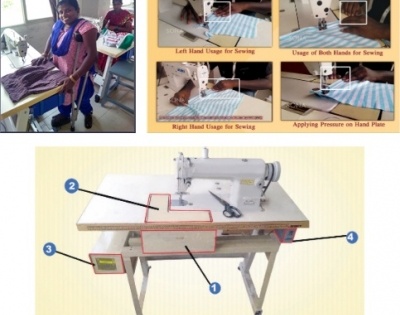Indian researchers earn patent for sewing machine for the disabled
By IANS | Published: May 14, 2022 12:37 PM2022-05-14T12:37:00+5:302022-05-14T12:45:22+5:30
Bengaluru, May 14 A team of Indian researchers has earned a patent for modifying industrial sewing machines used ...

Indian researchers earn patent for sewing machine for the disabled
Bengaluru, May 14 A team of Indian researchers has earned a patent for modifying industrial sewing machines used by the garment industry that can now be used by people with special needs, especially those with lower-limb disabilities.
It is estimated that among the differently-abled in the country, nearly 20 million are either without a lower limb or have issues that hamper free foot mobility.
The researchers from the fashion technology department at Salem's Sona College of Technology disabled the foot pedal and added a L-shaped metal plate in the top sewing area.
A gentle press of the hand on the plate activates a mechanism that runs the machine, the machine speed and sewing (folding and feeding) can be done using both the hands.
A slightly firmer pressure on the plate increases the speed of the sewing machine.
Large garment makers currently use industrial sewing machines that are best operated using foot pedals.
The foot pedal design and operating mechanism is not suitable for people with special needs, especially those with lower limb disabilities.
"The team came up with a technical modification, trained and certified over 100 women on the modified sewing machine operation. A few women are already making a living using these machines," said Chocko Valliappa, Vice Chairman, Sona group of education institutions.
"We are excited that the patent has been granted and sewing machine makers are discussing possible transfer of technology,": he added in a statement.
The modifications work on the principle of a load cell in a weighing machine where application of pressure converts into voltage for controlling motors.
An uninitiated person needs three to four days of training on the machine that is suitable for work from home and helps them contribute financially to the family.
According to Professor Dr D Raja, this is the third patent earned by the researchers in the department, while 12 more patent applications await final approval.
The earlier two patents were for design and development of "frictionless ring and traveller combination in a ring frame" and "dynamic sweat transfer tester for multi weave fabric".
Disclaimer: This post has been auto-published from an agency feed without any modifications to the text and has not been reviewed by an editor
Open in app